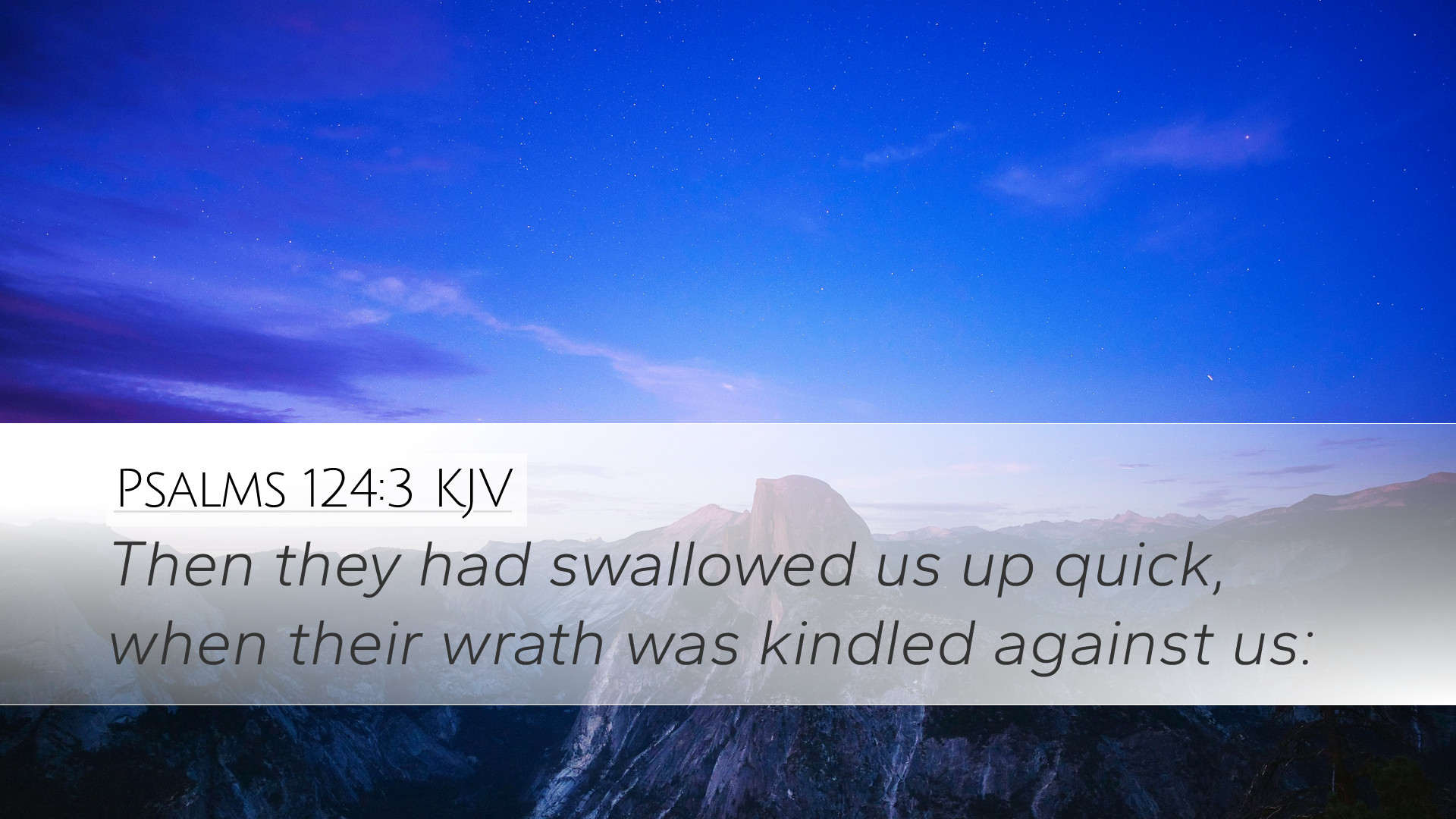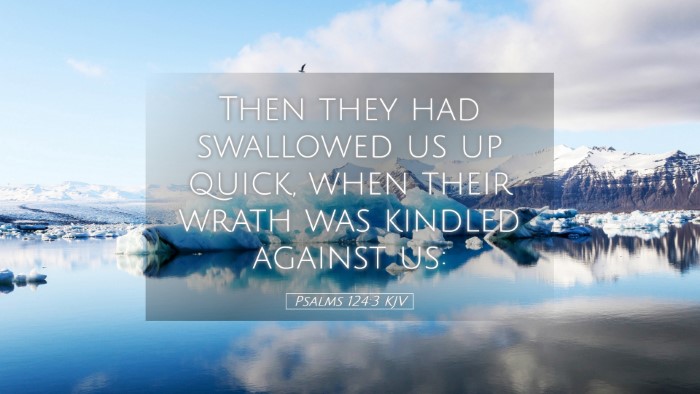Psalms 124:3 Commentary
Psalms 124:3: "Then they had swallowed us up quick, when their wrath was kindled against us." (KJV)
Contextual Background
The Psalms are a collection of religious songs, prayers, and poems found in the Old Testament. Psalms 124 stands within a group known as the Songs of Ascents, which were sung by the Israelites as they made their way to Jerusalem for worship. This particular psalm emphasizes the deliverance of Israel from the might of their enemies.
Interpretation of Psalms 124:3
In this verse, the psalmist articulates a powerful metaphor about the threat posed by adversaries. The imagery of being "swallowed up" illustrates a dire state of being overwhelmed, likely referring to physical dangers or mortal peril. The phrase "quick" indicates rapidity, suggesting that without divine intervention, the fate of the people would have been sealed swiftly, akin to being consumed in an instant.
- Wrath of Adversaries: The "wrath" represents the intense anger and hostility faced, portraying enemies who are not just passive but actively seeking to destroy. This implies a direct correlation between the enemies' emotional state and intent, highlighting the seriousness of their opposition.
- Judgment and Deliverance: The psalmist uses this language not merely to express fear but to acknowledge a profound truth about divine protection. Their acknowledgment of God's role in their survival indicates a deep sense of gratitude.
- Symbolism of Swallowing: The use of "swallowing" as a metaphor places an emphasis on the complete and consuming nature of the threat, a common Biblical symbol for divine judgment or disaster aimed at those who defy God.
Commentary Insights
Matthew Henry's Commentary
Henry remarks upon the psalmist’s dependence on divine aid, suggesting that all believers might face overwhelming odds that could lead to despair. He emphasizes the importance of remembering God's deliverance as a source of strength and comfort. Henry points out that awareness of God’s sovereign care and mercy portrays a belief in His protective power, thus reinforcing community faith.
Albert Barnes' Notes
Barnes provides a detailed analysis of the enemies metaphorically represented as a consuming force. He states that the reference to being "swallowed up" is indicative of near-total annihilation, stressing that it is not merely a physical defeat but a spiritual one. Barnes underscores the psalmist's role in fostering hope through recollections of past deliverance, elevating trust in God as fundamental for the faithful.
Adam Clarke's Commentary
Clarke discusses the historical context and how this verse might apply to the various trials faced by the Israelites, including battles and oppression. He emphasizes the necessity for communal remembrance of God's past acts of salvation, asserting that such memories are crucial for sustaining faith amidst challenges. Clarke also reflects on God’s authority, positing that His intervention allows believers to overcome otherwise insurmountable obstacles.
Theological Reflection
This verse offers profound theological implications regarding divine intercession and human vulnerability. The acknowledgment of being nearly consumed by wrath invites a reflection on the nature of evil and suffering in the world. It illustrates a dichotomy between the power of God versus the power of adversaries—an essential theme for theological study.
- The Sovereignty of God: This verse reinforces the belief in God's unyielding sovereignty over human affairs, where His power supersedes the might of adversaries.
- The Nature of Wrath: It prompts an examination of the implications of divine and human wrath, encouraging discussions regarding justice, mercy, and the character of God.
- Dependence on Divine Rescue: It encourages believers to rely on God’s deliverance, serving as an exhortation to trust in His faithfulness amidst trials.
Application for Pastors and Theologians
As leaders in faith, pastors can draw from Psalms 124:3 to emphasize the faithfulness of God as a source of hope during difficult times. It can be used to encourage congregations to remember and share testimonies of God’s past deliverances, thereby fostering unity and mutual encouragement.
Theological scholars may find this verse pivotal in discussions of God’s intervention in human history. It invites a more profound exploration of themes like covenant, divine mercy, and the struggle between good and evil. This exploration can facilitate a richer understanding of the biblical narrative and its application in contemporary contexts.
Conclusion
Psalms 124:3 stands as a powerful reminder of the dangers that surround believers and the ultimate protection that God offers. By blending insights from various public domain commentaries, we gain a multifaceted view of its significance—both for individual believers and the larger faith community. It resonates not only with personal experience but also with broader theological themes, reinforcing understanding of divine sovereignty and grace amidst hostility.


